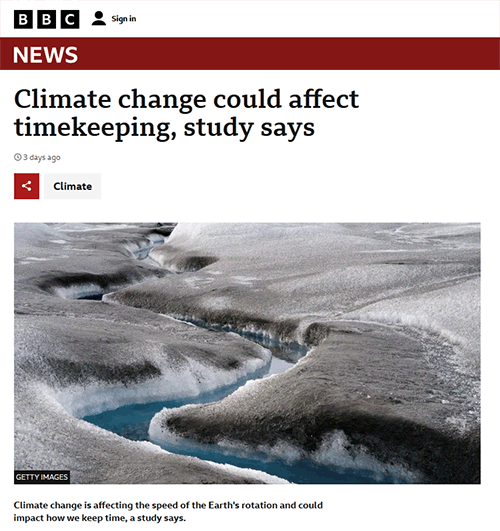By Jo Nova
Sometime a few years ago the Carbonistas stopped trying to pretend it was science, climate change has morphed into a ecclesiastical piñata instead. (If they whack it hard enough, grants fall out).
Instead of talking about 30 year trends (because they were wrong), the experts started coloring weather maps blood red and hyperventilating with every warm weekend. So it makes perfect sense they need the ritual reminders of holy mythology, and this is one of those stories. It’s the weekly nod for the awestruck fanatics that the world really does revolve around “climate change”. They can nod solemnly, and pat each others solar panels.
The theory is that because our showers are too long or our beef steaks are too big (don’t you feel important?), the poles are melting and some ice near the poles has dribbled out to the equator, slowing the planet’s spin. Since the Earth is a rotating ball of rock 10,000 kilometers across, the movements of a few millimeters of water on the surface are somewhat minor. But nevermind. So the dire news, such as it isn’t, is that the Earth’s clocks might have to be wound back by one whole second in 2026.
Someone will do a cost-benefit analysis soon on whether spending a quadrillion dollars can prevent this.
The drama here is that this is something has never been done before, at least since clocks were invented, five minutes ago in Earth’s geological history. The ice has, of course come and gone many times all of its own accord, and clocks have leapt forward one second 27 times since the 1970s, but this is the epochal moment that you can tell your grandchildren about — the day the Earth started slowing, and you were there! (Nobody mention that dinosaurs only had 23 hours in a day, no wonder they went extinct. Let’s obsess about a second, instead!)
In a not-so-great moment in modern science communication the BBC manages to say everything and nothing all at once:
Accelerating melt from Greenland and Antarctica is adding extra water to the world’s seas, redistributing mass.
That is very slightly slowing the Earth’s rotation. But the planet is still spinning faster than it used to.
The effect is that global timekeepers may need to subtract a second from our clocks later than would otherwise have been the case.
Got that? So climate change is delaying the great negative leap second. Wait?
And it’s unprecedented, of course:
“Things are happening that are unprecedented.” The negative leap second has never been used before and, according to the study, its use “will pose an unprecedented problem” for computer systems across the world.
The world may have adjusted its day-length 100,000 times, but this is the first time a sentient species with optical strontium clocks and a Windows 11 quagmire will try to go back in time by one second.
“This has never happened before, and poses a major challenge to making sure that all parts of the global timing infrastructure show the same time,” Mr Agnew, who is a researcher at the University of California, San Diego told AFP news agency.
It’s like Y2K all over again but with sermons and hymns.
When all the world is a climate-change-grant, everything on Earth is climate change problem.
REFERENCE (for those wondering if this is an April 1 trick)
Duncan Carr Agnew (2024) A global timekeeping problem postponed by global warming, Nature, 4334. https://doi.org/10.1038/s41586-024-07170-0
